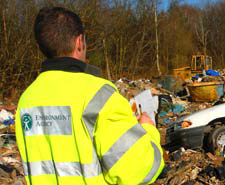Environment Agency cracks down on organised crime in waste industry
 Guns, ammunition, stashes of cash and luxury cars are being seized as environment authorities try to stop organised criminals muscling in on Britain’s £9 billion waste industry, The Times can reveal.
Guns, ammunition, stashes of cash and luxury cars are being seized as environment authorities try to stop organised criminals muscling in on Britain’s £9 billion waste industry, The Times can reveal. Investigations by the Environment Agency have found that gangs are illegally dumping, burying and burning commercial rubbish and setting up waste businesses as a legitimate front for illegal activities, including drug trafficking.
The agency is examining 36 waste businesses across Britain and intends to confiscate £25 million of criminal proceeds. It has discovered that most of the businesses are being run by known criminals whose previous convictions include drug trafficking, fraud, possession of firearms, rape, grievous bodily harm and threats to kill.
Like the Mafia did in New York and the Camorra did in Naples, British criminals regard controlling the waste industry as a way to generate income and launder money. They are setting up bogus companies and running them in a seemingly professional manner, with business cards, logos and legitimate-sounding answering machine messages. They are undercutting legitimate waste companies on price, especially in the high-cost area of disposing of hazardous materials such as asbestos and engine oil.
The agency is investigating the shipping of 1,400 tonnes of hazardous waste from Britain to Brazil, although there is no suggestion that organised crime was involved. Three Brazilian immigrants were arrested in Swindon last week and released on bail. Investigations into waste scams found evidence of illegal operators using intimidation to scare off business competitors. In one case a rogue skip operator smashed all the windows and lights of a rival’s lorry and smeared it with human excrement “to discourage his business activities”, the agency said.
The agency found luxury cars, semi-automatic guns and ammunition during raids on the homes of illegal waste operators. A six-figure sum in used notes was retrieved in one case. In another, £42,000 in cash was discovered in a concealed place. Confiscation orders are being pursued and some cases are awaiting trial.
From six cases alone, the agency has, in conjunction with police around Britain, seized £1.5 million in proceeds of crime.
From this year it has been able to keep 37.5 per cent of the value of goods seized in cases that it prosecutes. So far £200,000 has been generated, which the agency has invested in new technology, staff training and strengthening environmental protection.
“Money that is confiscated from environmental criminals goes directly back into protecting the environment,” John Burns, the agency’s national enforcement officer, said.
His newly established National Environmental Crime Team calculates how much money each convicted eco-criminal has made from wrongdoing.
Mr Burns said: “Various methods are employed, including court orders and requests for information under legislation that allows for the exchange of information. Inquiries are also carried out to identify potential assets that can be realised to satisfy any future confiscation order.”
The specialist team was set up last year to target offenders who are adept at covering their tracks. “Waste crime is often committed by career criminals with experience in avoiding detection across a portfolio of illegal activities including drugs and fraud,” Mr Burns told The Times. “These gangs can handle huge amounts of industry and business waste, bringing serious damage to the environment.
“Demolition waste, sometimes including hazardous materials such as asbestos, is often burnt, buried or mixed with legitimate materials such as landscaping soil. Burning waste can affect air quality and disperse dangerous fumes, while burying and mixing wastes can contaminate soil and pollute groundwater and rivers.”
Legitimate operators can spend as much as £10,000 for a permit and must pay an annual fee of £2,396, which ensures their regulation by the Environment Agency. Illicit operators avoid formal scrutiny by not registering. The agency fears that pressure from the economic crisis will encourage more criminals to enter the waste industry as struggling companies seek cheaper ways to dispose of their waste.
The Environmental Services Association, which represents genuine businesses, estimates that the industry is worth £9 billion a year in Britain.
By Richard Kerbaj - The Times
You can return to the main Market News page, or press the Back button on your browser.

